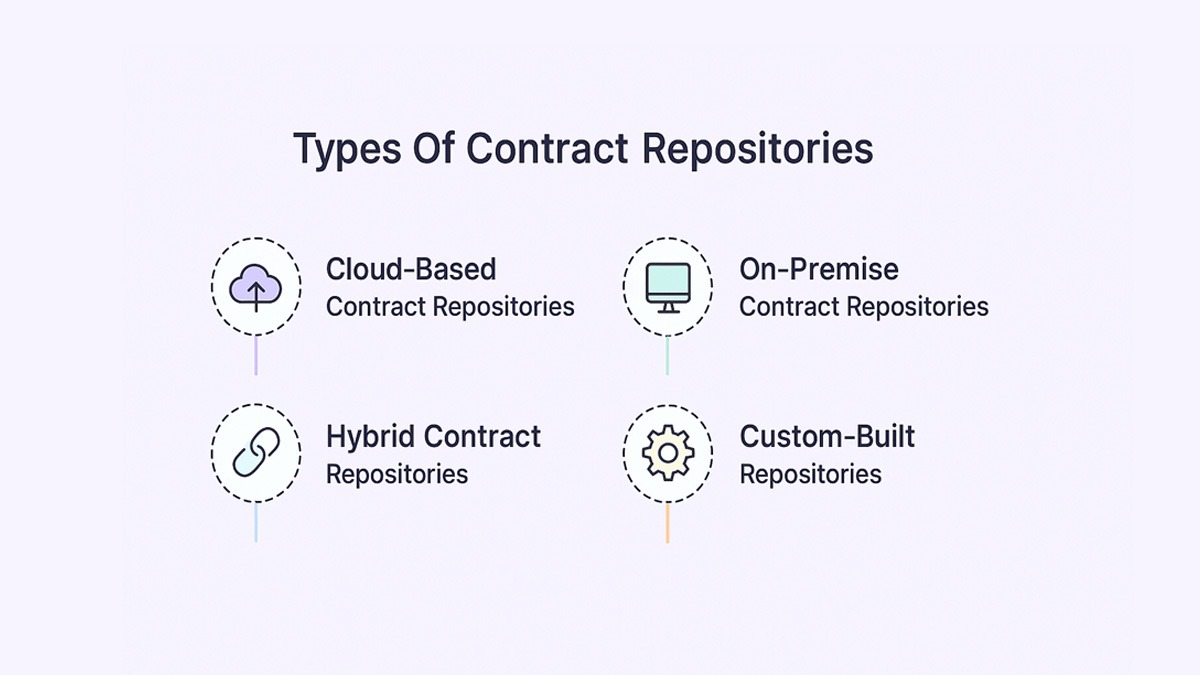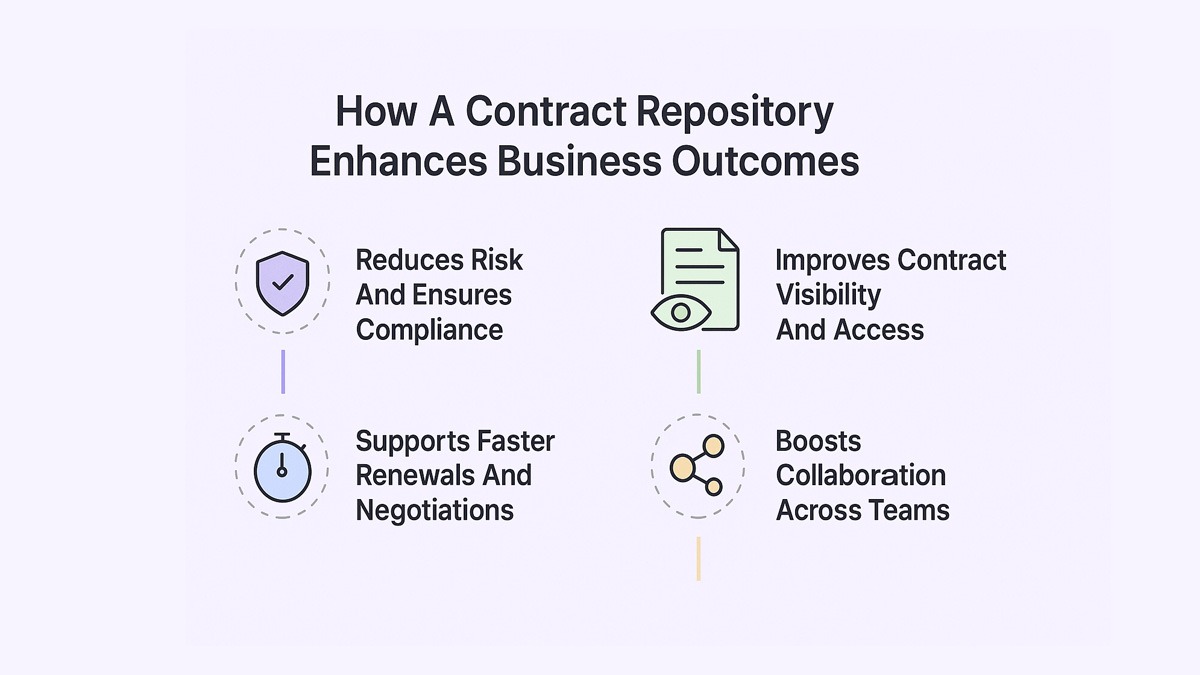

What Is a Contract Repository? The Hidden Power Behind Smarter Contract Management

What Is a Contract Repository? The Hidden Power Behind Smarter Contract Management
Explore what a contract repository is, key features, types, and how it improves contract visibility, compliance, and renewals.


Imagine trying to track hundreds of contracts buried across emails, shared drives, and dusty file cabinets. Missed renewal dates, misplaced versions, and compliance risks become the norm. That’s where a contract repository changes the game. It’s not just storage - it’s a system of clarity, control, and compliance that helps businesses stay on top of every agreement, from creation to closure.
What this blog covers:
- What is a contract repository?
- Contract repository vs. traditional document storage
- Key features of a centralized contract repository
- Types of contract repositories
- How a contract repository enhances business outcomes
- How Spendflo helps with contract management efficiency
- Frequently asked questions on contract repository
What is a Contract Repository?
A contract repository is a centralized digital system that stores, organizes, and manages all company contracts in one secure location. It allows teams to easily access, track, and analyze contract data, ensuring visibility, compliance, and efficiency throughout the contract lifecycle. A strong contract lifecycle management system helps streamline every stage, from creation to renewal.
Contract Repository Vs. Traditional Document Storage
Traditional document storage might have worked when businesses dealt with fewer contracts. But as contract volumes grow and compliance becomes stricter, those old systems start to buckle. A modern contract repository isn’t just a digital filing cabinet - it’s built to handle complexity, automation, and cross-functional visibility. Here’s how the two stack up:
Key Features Of A Centralized Contract Repository
A centralized contract repository isn’t just a convenience - it’s a strategic asset. It removes chaos from contract management and replaces it with structure, transparency, and control. Whether you’re scaling fast or simply trying to make sense of hundreds of active contracts, these features are what make a centralized system indispensable. Users can tag key contract attributes for easier filtering and reporting.
Advanced Search and Filter Options
No more digging through cluttered folders or old email threads. With smart search capabilities, teams can locate any contract instantly using filters like vendor name, contract type, date range, department, or even custom tags. Leading platforms also support multilingual search to accommodate global contract teams. It reduces time spent searching and improves productivity across teams.
Built-In Version Control and Audit Trails
Every change made to a document is recorded and traceable. You’ll never lose sight of who updated what and when. This level of transparency is crucial for audits, internal reviews, and compliance reporting. It also ensures legal workflows are clearly documented and traceable.
Automated Alerts and Milestone Tracking
Set up automated reminders for contract renewals, terminations, or key milestones like compliance check-ins. No more relying on spreadsheets or someone’s calendar to flag critical dates.
Access Control With User Permissions
Need legal to edit but finance to view only? You got it. Role-based access ensures that sensitive documents are only accessible to the right people at the right time. These systems also offer customizable permission structures for complex organizations.
Integration With Procurement, Legal, and Finance Systems
The best repositories connect with your existing stack - whether it’s Salesforce, DocuSign, Coupa, or NetSuite - so data flows freely, and tasks like contract generation or approval routing become smoother and more automated. Some systems even integrate with Enterprise Resource Planning tools to align contracts with broader business operations.
Types Of Contract Repositories
Different businesses have different needs, and not all repositories are built the same. Let’s break down the main types you’ll find today:

Cloud-Based Contract Repositories
Hosted on secure cloud servers, these are accessible from anywhere. Ideal for remote teams and growing businesses, they offer real-time collaboration and automatic updates without heavy IT maintenance. Cloud technology makes access and updates seamless across geographies.
On-Premise Contract Repositories
Installed and managed within a company’s internal infrastructure, these repositories offer full control and heightened security - preferred by industries with strict compliance needs like finance or healthcare.
Hybrid Contract Repositories
A mix of cloud and on-premise solutions. Businesses can keep sensitive contracts in-house while enjoying cloud benefits for everyday operations.
Custom-Built Repositories
Tailored systems designed for specific workflows or compliance requirements. While costly upfront, they deliver unmatched flexibility for large enterprises.
Each type serves the same purpose - to make contract management smarter and more secure - but the right fit depends on scale, budget, and compliance priorities.
How A Contract Repository Enhances Business Outcomes
A well-implemented contract repository doesn’t just support your legal team - it drives results across the organization. When contracts are easier to find, manage, and act on, the business moves faster and with more confidence. Here’s how a modern repository improves outcomes at scale:

Reduces Risk and Strengthens Compliance
Every organization deals with compliance - whether it’s industry regulations, data protection laws, or internal policies. A repository provides version control, access logs, and automated workflows that make it easier to stay compliant and prepare for audits. No more scrambling when legal comes knocking.
Improves Visibility Across the Organization
Gone are the days when only the legal team knew what’s in the contract. Repositories give authorized users across departments access to relevant documents - helping finance, procurement, and operations stay aligned. Greater visibility leads to fewer misunderstandings and better execution.
Accelerates Renewals and Negotiations
With renewal dates and contract terms clearly tracked, teams can get ahead of key milestones. This means they can renegotiate pricing, assess performance, and make informed decisions before deadlines hit - not after. Teams can also refine long-term contract strategies using historical insights.
Enables Smarter, Data-Driven Decisions
Many repositories come with reporting dashboards that offer insights into vendor performance, contract volumes, and cost exposure. A visual contract dashboard brings all this data into one easy-to-read view. That data helps executives spot trends, mitigate risks, and identify opportunities for savings or consolidation.
Fosters Cross-Functional Collaboration
Contract management isn’t a solo sport. With centralized access and automated notifications, cross-functional teams can collaborate more effectively - whether it’s sales initiating a new agreement or finance reviewing payment terms.
Ultimately, a contract repository gives teams the clarity and control needed to move faster and work smarter.
The Role of a Contract Repository in Streamlining Renewals
Renewals are where money is won or lost - yet they’re often treated as an afterthought. Modern contract management tools help mitigate this by surfacing risks early. Without a centralized system, teams rely on calendar invites, scattered emails, or outdated spreadsheets to track contract deadlines. That’s how businesses end up locked into unfavorable terms or paying for software they no longer use.
A contract repository changes that. It centralizes renewal data, automates reminders well ahead of deadlines, and surfaces key terms and obligations so teams can prepare in advance. Procurement can evaluate vendor performance, finance can reassess costs, and legal can review risk - all before the clock runs out.
This proactive visibility empowers businesses to renegotiate, consolidate, or terminate contracts with confidence. No more surprises. No more rushed decisions. Just clean, clear, and strategic contract lifecycle control.
How Spendflo Helps With Contract Management Efficiency
Spendflo helps businesses move from scattered document management to streamlined contract visibility. By centralizing all vendor contracts in one intelligent platform, it simplifies renewals, tracks spend, and ensures compliance. Automated alerts prevent missed renewals, while Spendflo’s expert-backed negotiation insights help companies save on every deal - without losing control over compliance or data security.
Frequently Asked Questions on contract repository
What are the benefits of using a contract repository?
It centralizes all contracts, reduces compliance risks, improves visibility, and automates renewals, helping teams save time and avoid costly oversights.
How secure are cloud-based contract repositories?
Most leading repositories use encryption, multi-factor authentication, and role-based permissions, ensuring that only authorized users can access sensitive contracts.
Can contract repositories handle different contract types?
Yes, they can store and categorize everything from vendor and employment contracts to NDAs, SLAs, and customer agreements.
How do I choose the right contract repository for my business?
Consider factors like security, scalability, integration needs, and ease of use. Cloud-based repositories work best for flexibility, while on-premise suits companies with strict compliance controls.
How do risk scoring, automated contract reminders, contract migration, and data cleansing improve contract management efficiency?
Together, these features streamline contract operations end-to-end. Risk scoring helps identify potential vendor or compliance issues early. Automated contract reminders prevent missed renewals. Contract migration ensures older agreements are safely centralized, while data cleansing keeps repositories accurate and up to date improving visibility, control, and decision-making.










.png)




.png)
















